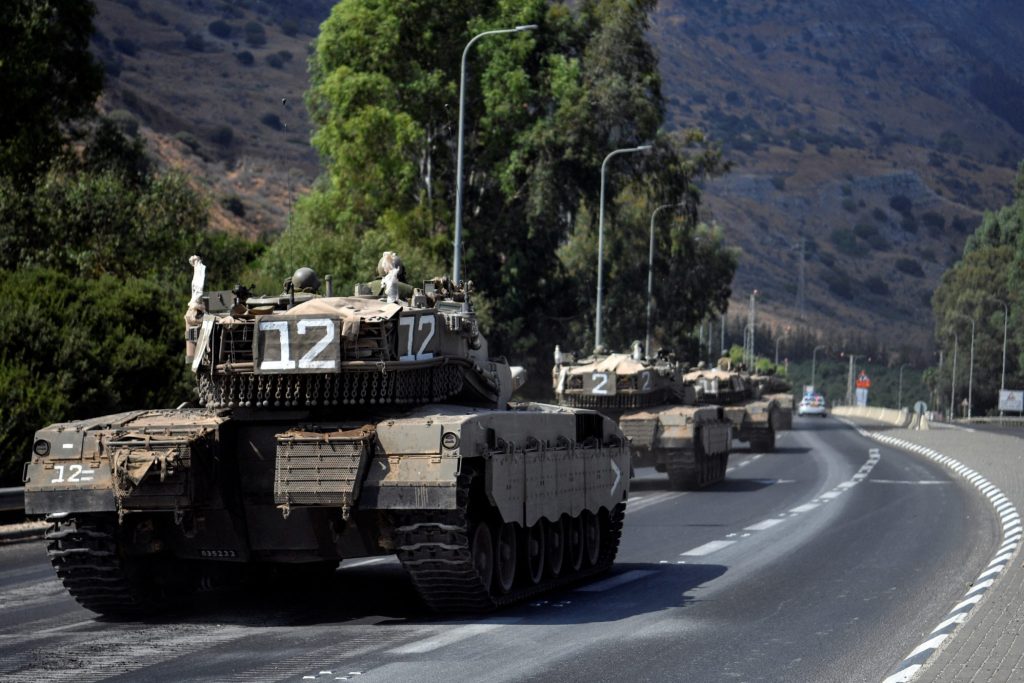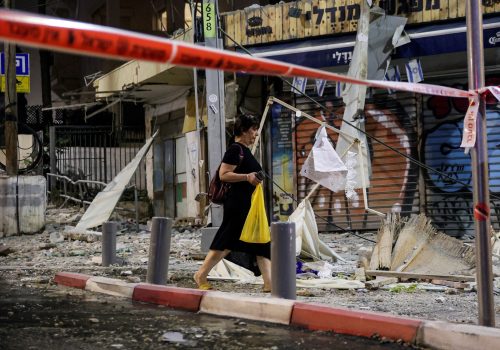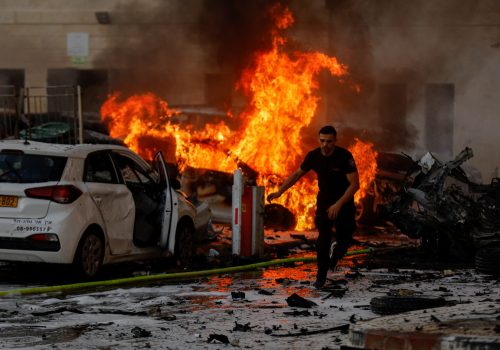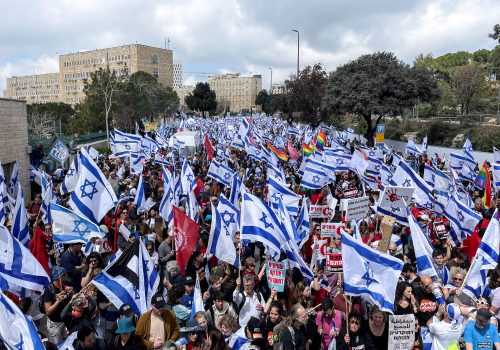Dispatch from Jerusalem: How does this end?
JERUSALEM—The streets of Jerusalem near government offices were unnervingly quiet today. Intersections famous for being the sites of regular protests were empty. Nearby shops were closed. The halls of the foreign ministry were sparsely populated as diplomats worked in shifts and from home, both to manage the heavy workload already upon them and also as a strategy to disperse risk. If the headquarters is hit by rockets, then the ministry would only lose a manageable percentage of its officers. When I visited the foreign ministry and the National Security Council staff in the mid-afternoon, the usual long line of appointment holders was entirely absent. The person at the foreign ministry security desk said I was the first American passport seen on her shift. This was a different Israel than I’m used to seeing.
Friends from think tanks and foundations whom I would typically call to exchange views on Israeli military strategies are now suddenly unavailable, called up immediately as reservists to help plan the war to come and already working through the first night. Today the government made official what Prime Minister Benjamin Netanyahu declared Saturday, formally establishing that Israel is in a state of war, a legal determination that allows for far more Israelis to be called back into military service. Initial air strikes on Gaza have already begun, and questions about the coming military campaign understandably dominates the news.
One day after Hamas’s terrorist attacks, the Israeli public appears deeply shocked, impressively united, and firmly resolute in the work to be done.
From a purely military perspective, however, Hamas lost the war the moment it decided to start it. Israel is a vastly superior power, and while war plans never survive first contact with the enemy, the military outcome of this one is hardly in doubt. One day after Hamas’s terrorist attacks, the Israeli public appears deeply shocked, impressively united, and firmly resolute in the work to be done. The Israeli public is eager for retribution, and Israeli politicians across the political spectrum are competing to sound the toughest, implicitly challenging each other to come up with new adjectives to describe the devastation that will rain upon Hamas.
The stories of Hamas’s massacres and abductions are only beginning to be told, and when all of the grim accounting is done it may be that more Israelis were murdered in one day than were during the entirety of the second intifada. Many outside of Israel may find it difficult to fully appreciate the depth of the emotional reaction here the day after the 10/7 attacks, but those Americans who remember what it felt like the day after 9/11 will find it eerily familiar. And just as 9/11 began a war that could only result in the eventual death of Osama bin Laden and the dismantlement of al-Qaeda, a similar fate awaits Hamas and its leadership in Gaza.
But wars are actually not won or lost on military factors alone. The United States learned this timeless lesson anew, and especially painfully, in both Iraq and Afghanistan. In 2003, in the opening weeks of the US invasion of Iraq, General David Petraeus famously asked, “Tell me how this ends.” The George W. Bush administration went to war without a clear answer to that fundamental question, without a realistic vision for how Iraq was to be governed after Saddam Hussein was overthrown.
Israel must not make a similar mistake. As its generals plan for the war, its political leaders must plan for the peace that follows. And that begins by ensuring that the right questions get asked at the outset. Here are a few of the most important that came up in my discussions today.
How can Israel ensure the campaign against Hamas doesn’t expand to a multi-front, regional war?
As I wrote Saturday, the only way for Hamas to achieve its strategic objectives is for the conflict to widen. Today’s news that Tehran reportedly advised and approved the 10/7 attacks is not surprising in the least, but it was notable that the sourcing for the story included senior members of Hamas and Hezbollah, and an advisor to the Syrian government. Iran clearly wants this story out, likely hoping to trigger an Israeli reaction resulting in a regional war.
How will Gaza be governed after the war?
Even before the 10/7 attacks, there were many in Israel who argued, incorrectly, in my opinion, that the 2005 disengagement from Gaza was a mistake. These voices will become louder in the weeks to come. I expect there is a consensus within the Israeli government that Gaza will not be allowed to return to the status quo of Hamas dominance after the war, but I don’t see any evidence of consensus yet on the preferred alternative. Some will argue for another occupation, at least in part, and still others will see an opportunity to renew the settler movement there. The downsides here are obvious, and one hopes that in the end, calmer heads will prevail. Others will argue for reextending the remit of the Palestinian Authority to Gaza, but its leadership is already having increasing difficulty managing the West Bank. And still, others will imagine importing a new strongman who opposes both Hamas and the current leadership of Fatah.
How will Israel be viewed internationally after the war?
Israeli diplomats are very familiar with being on the receiving end of unfair foreign narratives that seek to delegitimize its right to self-defense. As such, they are already assessing the “legitimacy window” for the war, the period of time during which its actions will be generally seen as appropriate by the foreign governments they care about most. The dynamics of this challenge are generally well understood, but the presence of so many foreign hostages presents a new set of potential problems. What will be the reaction when Hamas uses them as human shields and some are killed by Israeli operations? How can Israel ensure that perceptions about the outcome of the war don’t undermine Israeli efforts to promote greater regional integration?
How will this war impact Israel’s domestic politics and national identity?
The second intifada left an indelible mark on Israeli politics, ushering in a clear center-right majority consensus on national security matters that has held ever since, and clearing the path toward the current divisions within Israeli society on matters of identity and governance. Will this war move Israeli politics farther to the right? Or will leaders take advantage of the opportunity to establish a national unity coalition and begin the process of stepping back from the country’s divisions?
None of these questions is easy to answer. But it’s encouraging to know that Israelis are beginning to ask them even before this war begins.
William Wechsler is the senior director of Middle East Programs at the Atlantic Council. His most recent US government position was deputy assistant secretary of defense for special operations and combatting terrorism.
Further reading
Sat, Oct 7, 2023
Dispatch from Tel Aviv: A new kind of conflict has begun
New Atlanticist By William F. Wechsler
The international community cannot reflexively repeat the threadbare slogans that have accompanied previous cycles of Israel-Hamas clashes.
Sat, Oct 7, 2023
Experts react: Israel is ‘at war’ after Hamas militants launch major assault
New Atlanticist By Atlantic Council experts
The Palestinian militant group Hamas launched its boldest assault on Israel in decades. Atlantic Council experts offer their thoughts on the events.
Mon, Mar 27, 2023
Experts react: Netanyahu just delayed his judicial overhaul after mass protests. What’s next for Israel’s democracy?
New Atlanticist By Atlantic Council experts
What’s next for Israel and its relations with the world? Our experts offer their insight.
Image: A convoy of Israeli military vehicles rides on a road close to Israel’s border with Lebanon in northern Israel, October 8, 2023. REUTERS/Gil Eliyahu ISRAEL OUT. NO COMMERCIAL OR EDITORIAL SALES IN ISRAEL




